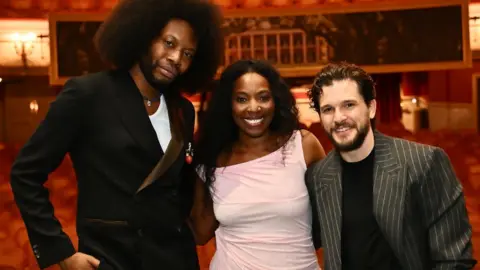Kit Harington defends play's 'black out' nights
Actor Kit Harington has defended his new play having dedicated performances for black audiences, denying that the initiative discriminates against white people.
Slave Play attracted controversy and criticism earlier this year when it was announced there would be two "black out" nights during the show's 12-week run.
Rishi Sunak, who was prime minister at the time, described the initiative as "wrong and divisive".
But Harington, who appears in the play, said of the scheme: "I’ve come to realise or believe that it’s an incredibly positive thing."
The Game of Thrones star also told the BBC's Laura Kuenssberg that the first black out performance, which took place earlier this month, was an "incredible show".
"Number one, if you are white, no-one’s stopping you buying a ticket, it’s not illegal to buy a ticket for that show, if you want to come," he said. "It’s saying, 'We would prefer the audience to be this'.
"Number two, I’ve been going to the theatre since I was young with my mum. I’ve only ever really known predominantly white audiences. It is still a particularly white space.
"So to have the argument that, oh, this is discriminating against white people, is I think vaguely strange and ridiculous."
Set on a plantation in the old American South, Slave Play explores "race, identity and sexuality".
Written by US actor and playwright Jeremy O Harris, it was a Broadway success and received 12 Tony nominations, although it did not win any.
 Getty Images
Getty ImagesThe Broadway run also had black out nights, which organisers said were intended for an "all-black-identifying audience".
"People have to be radically invited into a space to know that they belong there," Harris told BBC Radio 4 earlier this year.
The second of the two black out performances in London's West End will take place in September.
Harington said "the energy on stage and in the audience" during the first one "was unlike anything I’ve ever experienced".
"And I do believe with this play and what it’s saying, that having a place where a certain group of people can come and feel open to laughing in a certain way, reacting in a certain way, in sort of safety, for two nights of the entire run, is a great thing."
His co-star Olivia Washington said: "To see black and brown people in a 900-seat theatre, I’ve never experienced that, as an audience member I’d never experienced that.
"So it was very special for me to experience in doing this play, because as you [Kuenssberg] said, it is difficult, it’s difficult subject matter, it can get hard for people to hear.
"However, to feel supported by this room in a different kind of way felt just – it felt really great."
Slave Play's producers told BBC News in February that the "intent is to celebrate the play with the widest possible audience", adding: "To be absolutely clear, no-one will be prevented or precluded from attending any performance of Slave Play."
'Needling theatre'
The show's West End transfer has received generally positive reviews from critics. The Guardian's Arifa Akbar described it as "charismatic, needling theatre" while the Evening Standard's Nick Curtis said it was "bold and scabrously witty" - with both critics awarding four stars.
Dominic Maxwell of the Times, however, awarded just two stars, saying the show was "the sort of ideas-led piece that would stimulate over an hour but has instead unwisely swollen to two hours".
His colleague Clive Davis, who attended the first black out night, said he had mixed feelings about the initiative.
"Did the composition of the audience affect the way the dialogue was received? I think so," he wrote, adding that the audience's laughter and commentary suggested they were particularly engaged.
Reflecting on the black out nights, he continued: "I still have my doubts... I still think better marketing is the more creative way to bring in new audiences."
However, several ticket buyers interviewed by Sky News on the night applauded the scheme.
One said it was "just about giving more people an opportunity to experience" theatre, while another said it was "not an exclusion thing, it's just we don't get the same opportunities" as white people.
